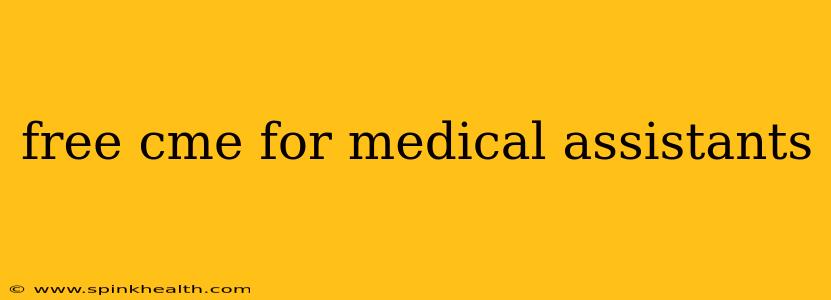The world of healthcare is constantly evolving, demanding continuous learning and professional development. For medical assistants, staying updated with the latest advancements, guidelines, and best practices is crucial, not just for career progression but also for providing the best possible patient care. The good news is that numerous resources offer free Continuing Medical Education (CME) opportunities, making professional enhancement both accessible and affordable. Let's embark on a journey to explore these avenues and unlock your potential.
What is CME and Why is it Important for Medical Assistants?
Before we dive into the free resources, let's establish the importance of CME. CME, or Continuing Medical Education, refers to educational activities designed to maintain, improve, and expand the knowledge, skills, and competence of healthcare professionals. For medical assistants, this translates to staying abreast of changes in medical technology, procedures, and regulations. Regular CME ensures you remain proficient in your role, contributing to enhanced patient safety and improved healthcare outcomes. It’s not just about ticking a box; it's about fostering a commitment to lifelong learning and professional excellence.
Where Can I Find Free CME for Medical Assistants?
Finding free CME resources might seem like searching for a needle in a haystack, but with a little digging, you'll discover a wealth of opportunities. Let's explore some avenues:
Professional Organizations:
Many professional organizations dedicated to medical assisting offer free or discounted CME resources to their members. These organizations often host webinars, online courses, and even in-person events featuring leading experts in the field. Joining such organizations can provide access to a community of professionals, networking opportunities, and a pipeline of valuable learning resources, sometimes at no cost.
Government and Public Health Agencies:
Government bodies and public health agencies frequently offer free CME opportunities related to specific health initiatives or public health emergencies. Keep an eye out for announcements and webinars on their websites, as these often provide valuable information and contribute towards your CME requirements.
Medical Associations and Societies:
Some medical associations and societies, even those primarily focused on physicians, offer resources relevant to medical assistants. While the focus might not always be directly targeted towards MAs, the information can often still be beneficial and applicable to your work.
Online Learning Platforms:
Several online learning platforms offer free CME courses, although these may sometimes have limitations or might offer full access only through a paid subscription. Look for reputable platforms with high-quality content and reviews before committing your time. Many offer free introductory courses or modules, which can be a valuable way to sample the material and assess its relevance to your professional needs.
Hospitals and Healthcare Systems:
Some hospitals and healthcare systems might offer free or internal CME opportunities to their employees. Check with your employer's Human Resources department or your supervisor to see if such programs exist within your organization.
How Often Should Medical Assistants Complete CME?
CME requirements vary widely depending on your state, employer, and certifying organization. Always check with your licensing board and employer for specific requirements, as these regulations can change. Staying informed about your responsibilities is key to maintaining a valid license and a compliant professional practice.
What Types of Free CME Are Available?
The types of free CME available are diverse, ranging from online modules and webinars to recorded lectures and podcasts. This allows you to choose a learning format that best suits your lifestyle and learning style. Be sure to select topics that align with your specific professional goals and areas where you wish to develop expertise. For example, you may focus on improving your phlebotomy skills or enhancing your understanding of electronic health records (EHRs).
Are there any downsides to free CME?
While free CME is an invaluable asset, it is important to acknowledge that there can be occasional limitations. Free resources might not always be as comprehensive or polished as paid options. The quality can vary, and the content may not always be as current as paid programs that undergo regular updates. Always review the credibility of the source and the content’s relevance to your professional practice before dedicating your time and attention.
In conclusion, accessing free CME opportunities for medical assistants requires a proactive approach and a willingness to explore different avenues. With careful research and a commitment to lifelong learning, you can enhance your skills, expand your knowledge, and excel in your profession, all while keeping your budget in check. The journey to professional growth is well worth the effort.

